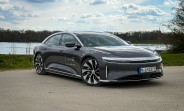China moves to ban hidden car door handles over safety fears
The sleek, flush door handles have quickly become a signature feature on many new electric cars. They are a symbol of futuristic design. They promise better aerodynamics and a clean look, but regulators in China want to bring this design trend to an end, blaming a growing list of safety failures and functional issues that far outweigh their benefits. This could reshape the look of many EVs hitting the market in the coming years.
Discussions among Chinese authorities are reportedly close to finalizing a new mandatory standard that would outright ban fully retractable door handles. The draft, expected this month, would give automakers a one-year grace period before the rule is enforced, likely starting in July 2027. After that date, car manufacturers selling new vehicles in China would no longer be able to use these hidden designs. The proposal doesn't ban all modern handles; semi-retractable and traditional designs will still be allowed, but with a critical new requirement: they must have a mechanical backup system to ensure they work even if the car's power fails.

Automakers claim hidden handles can improve a car's drag coefficient by as much as 0.03 Cd, but independent research suggests the real improvement is as low as 0.005 Cd. That translates to an energy saving of about 0.6 kWh over 62 miles - a negligible amount for most drivers.
Worse, the motors and mechanisms needed for these handles add up to 18 lb of weight, which can easily cancel out any minor aerodynamic advantage. They are also notoriously unreliable and expensive, reportedly costing three times more than mechanical handles while failing eight times as often. According to local reports, door handle failures now account for a startling 12% of all vehicle repair cases for one leading EV brand.

But the most serious concerns are about safety. In emergencies, these electronic handles can become a deadly trap. The China Insurance Automotive Safety Index (C-IASI) found that in side-impact crash tests, cars with electronic handles had only a 67% success rate for the doors popping open, compared to a 98% success rate for vehicles with traditional mechanical handles.
Real-world incidents have been even more terrifying. During a cold snap in Changchun in 2024, occupants of an EV were trapped inside when the handle motors froze. That same year, heavy rains in Guangdong caused short circuits in several electric cars, preventing the doors from opening and forcing passengers to smash windows to escape.

Data from China's National Accident In-depth Investigation System (NAIS) highlights the growing problem. The agency reported a 47% rise in accidents caused by door handle failures in 2024, with hidden handles being the culprit in 82% of those cases. The Consumer Association noted a 132% year-over-year jump in complaints about children's fingers getting pinched by the automated handles in 2024, with some incidents resulting in broken bones.
Not everyone in the auto industry was sold on the trend. Wei Jianjun, the Chairman of Great Wall Motor, has been a vocal critic of hidden door handles, stating their "contribution to drag reduction is negligible," and calling them "heavy, have poor sealing, are noisy, and rely on electric power, posing safety hazards."

Some brands, like Volkswagen, have been using semi-retractable handles that offer a modern look but without sacrificing safety. FAW-Audi's latest models have a clever semi-retractable handle that deploys a red pull cord in a collision, giving first responders a reliable mechanical way to open the door.
The potential ban on hidden door handles is part of a larger global conversation about questionable design trends in modern vehicles, especially electric cars. Regulators are also looking at missing physical buttons for critical functions, replaced by large touchscreens.
The European New Car Assessment Programme (Euro NCAP) has already announced that starting in 2026, cars that bury controls for things like turn signals, wipers, and hazard lights in a touchscreen menu will not be eligible for a five-star safety rating. The message from regulators in both the East and the West seems to be clear: futuristic looks should never come at the expense of fundamental safety.
Reader comments
- edoorgate
- kmq
Efforts to circumvent this ban should be heavily penalized with not only fines but in particular with jail time for top leadership.
- Anonymous
- SqW
When i first saw those handles, the first thing it came to my mind is that planned obsolence doesn't hide anymore





Facebook
Twitter
Instagram
RSS
Settings
Log in I forgot my password Sign up